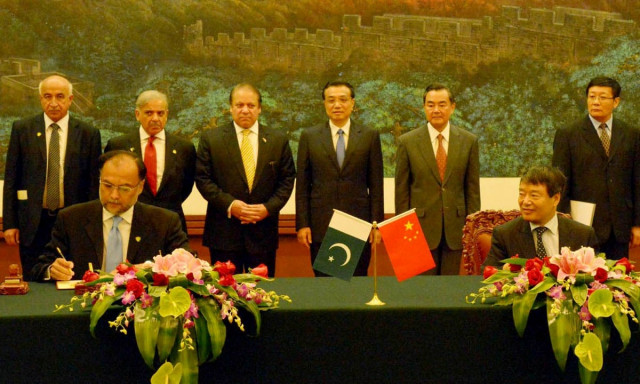A partnership or a dependency
China is looking out for its self-interest, and if Pakistan can benefit from it than there is no better outcome.

Nawaz Sharif and Chinese Premier, in an agreement signing ceremony in Beijing. PHOTO: Government of Pakistan website.

A trade corridor that links the Chinese city of Kashgar to Gwadar would pass through Gilgit-Baltistan, Khyber-Pakhtunkhwa and Balochistan, and create a second national economic artery to rival the one that currently stretches through Punjab and Sindh, offering some of the poorest parts of the country a link to the world economy and with it a path to prosperity. This is something that should have been done decades ago, and should it happen as planned, we would be delighted.
But while the celebrations continue in Islamabad and Beijing, we are tempted to ask a few questions, particularly of our foreign policy mandarins. What sort of a relationship is it that we seek with China? And what exactly do we think China views us as? We would venture to guess that the two views are vastly different and that our penchant for using absurdly hyperbolic phrases to describe this alliance is unwarranted.
The Chinese view of Pakistan is evident in these agreements that have been signed in this trip: China sees Pakistan primarily as an occasional strategic asset with whom it wishes to cultivate an economic relationship. The trade corridor from Kashgar to Gwadar, for instance, is meant to help connect China’s lesser developed western hinterland to global markets and allow those regions to share in the rest of China’s prosperity. While Beijing is willing to occasionally help Islamabad out, it seems to have a greater desire to have a relationship of economic partnership, not one of dependency.
Pakistan, on the other hand, appears to look upon China as a huge benefactor, which can always be relied upon for financial and technological assistance, even when the need for such assistance arises as the result of poor choices on our part. We seem to think that Beijing will continue to hand out freebies to us, especially on occasions when Washington cuts off the money spigot. The reality may be that like any country, China does what it does for its primary self-interest, and if Pakistan can benefit from that, then there is no better outcome than that.
It is deluded to think that China will keep on handing out goodies in exchange for nothing. Beijing appears to be making it clear, though in a subtle manner, that it will do nothing of the sort, and that it expects Islamabad to pull its own weight. In all the agreements signed this past week, for instance, there is no mention of any significant Chinese financial assistance. The Chinese companies that have signed agreements with Pakistan are all service providers, which are being paid for their work by Pakistani taxpayer money (and heavy bank borrowing by the government of Pakistan). It is not Chinese charity, and to its credit, the Chinese leadership does not pretend that it is.
Pakistan’s view of China appears to be seriously misguided, and as a result, our China policy appears focused primarily on begging for assistance rather than building an economic partnership, which Beijing has made abundantly clear it is more than happy to offer. This is an enormous waste of diplomatic energy and the Foreign Office would do well to consider a serious redrafting of their view of our northeastern neighbour.
It does not make sense to be dependent upon the goodwill of larger countries as a matter of policy. It makes even less sense to do so when none of them appear interested in taking Pakistan on as a ward. Let us hope that our foreign policy will, in the future, accommodate this understanding. Maybe then, we will be able to build a real partnership with China.
Published in The Express Tribune, July 8th, 2013.
Like Opinion & Editorial on Facebook, follow @ETOpEd on Twitter to receive all updates on all our daily pieces.















COMMENTS
Comments are moderated and generally will be posted if they are on-topic and not abusive.
For more information, please see our Comments FAQ